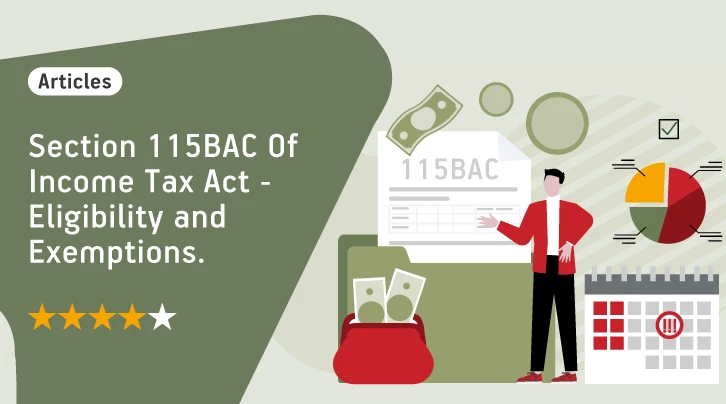The Indian Government is consistently working towards simplifying the tax structure for the common man. The introduction of section 115BAC is one of the latest steps in this direction. Read this post to know more about this section.
Section 115BAC is one of the significant changes introduced in the Income-tax Act in the Union Budget 2020. Also known as the new tax regime, it aims to simplify the tax structure.
Once you understand the various aspects of this new section, you can decide whether to migrate to this new regime or stick to the old one for now. In this blog post, we will discuss this new section in detail.
What Is Section 115BAC - The New Tax Regime?
Section 115BAC of the income tax act aims to offer lower tax rates to taxpayers willing to give up most of the tax deductions and exemptions available under the current tax regime.
Under section 115BAC, taxpayers can opt to pay taxes at a lower tax rate without claiming any deductions or exemptions.
Who Is Eligible for Section 115BAC?
Any individual or HUF (Hindu Undivided Family) can opt for section 115BAC. Salaried taxpayers can choose the new tax regime at the beginning of the financial year and inform their employer. Once a salaried person chooses the new tax regime, it can't be changed during that financial year. However, the person can return to the old regime in the next financial year.
The Case Is Different for a Non-salaried Taxpayer
Unlike salaried individuals, taxpayers who earn income from business or profession are not allowed to switch between the old and new tax regimes every year. These individuals are allowed to opt out of the new tax regime. However, they'll not be allowed to choose the new tax regime again in the future.
What Are Income Tax Slabs and Rates in Section 115BAC?
Following are the latest income tax slabs and corresponding rates under section 115BAC of the income tax act as notified in the Budget 2023.
Annual Income Range |
Rate of Income Tax |
Up to ₹ 3 lakhs |
Nil |
₹ 3 lakhs to ₹ 6 lakhs |
5% |
₹ 6 lakhs to ₹ 9 lakhs |
10% |
₹ 9 lakhs to ₹ 12 lakhs |
15% |
₹ 12 lakhs to ₹ 15 lakhs |
20% |
Above ₹ 15 lakhs |
30% |
Exemptions and Deductions under Section 115BAC
The following are the major tax exemptions available under the new tax regime from 1st April 2023.
Type of Deduction |
Maximum Permissible Amount (in ₹) |
Standard Deduction |
50,000 |
Rebate u/s 87A |
25,000 |
Interest on Home Loan u/s 24B on Let-out property |
No limit (subject to applicable terms and conditions) |
Employer's contribution to NPS u/s 80CCD(2) |
10% of salary (basic + dearness allowance) |
Deduction u/s 57(IIA) of family pension income |
15,000 |
Exemption on the amount received during voluntary retirement u/s 10(10C) |
5,00,000 |
Exemption on gratuity u/s 10(10) |
20,00,000 |
Deductions That Are Not Applicable under Section 115BAC
Taxpayers can’t claim some popular deductions under the old tax regime once they choose section 115BAC. Here is the list of some important deductions unavailable under 115BAC.
Section 80C
Deductions for investments made in instruments such as the Public Provident Fund, National Savings Certificate, Life insurance premium, ELSS, etc.
Also Read : What is ELSS fund?
Section 80D
Deductions for health insurance premiums.
Section 80G
Deductions for donations made to charitable institutions.
Section 80TTA
Deductions for interest earned on savings accounts of banks, cooperative societies, or post offices.
Section 80E
Deductions for interest paid on education loans are not available under Section 115BAC.
Choose After Careful Consideration
Now that you’re well aware of what to expect from the new tax regime, weigh the pros and cons from your perspective before choosing. For instance, consider your earnings and see how your tax liability is impacted in the absence of the regular tax exemptions available under the old regime. Make an informed decision to optimise your tax benefits.
Also Read: The Mutual Fund Advantage in Tax Saving
Mutual Fund investments are subject to market risks, read all scheme related documents carefully.






 1800-270-7000
1800-270-7000




